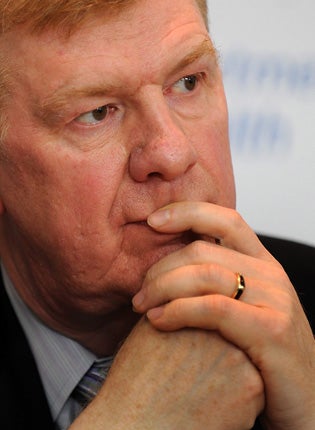Doctors fail to agree tests on competence

Your support helps us to tell the story
From reproductive rights to climate change to Big Tech, The Independent is on the ground when the story is developing. Whether it's investigating the financials of Elon Musk's pro-Trump PAC or producing our latest documentary, 'The A Word', which shines a light on the American women fighting for reproductive rights, we know how important it is to parse out the facts from the messaging.
At such a critical moment in US history, we need reporters on the ground. Your donation allows us to keep sending journalists to speak to both sides of the story.
The Independent is trusted by Americans across the entire political spectrum. And unlike many other quality news outlets, we choose not to lock Americans out of our reporting and analysis with paywalls. We believe quality journalism should be available to everyone, paid for by those who can afford it.
Your support makes all the difference.Ten years after the reputation of the medical profession was ripped apart by the Bristol children's heart surgery disaster and the Harold Shipman murders, efforts to introduce regular checks on doctors' competence, known as the medical MOT, have foundered again.
Leaders of the British Medical Association have detonated a bombshell under the latest negotiations, calling on the General Medical Council, the profession's disciplinary body, to go "back to the drawing board" with its plans for five yearly checks to ensure doctors are up to date and have the necessary skills.
The repeated failure to agree on a system of checks during the decade-long stand-off between the two organisations has left patients without the fundamental protection of knowing that the doctor treating them is safe. Under the current system, doctors join the medical register on passing their qualifying exams and may not undergo further checks on their competence for the next 40 years.
The GMC first proposed in June 2000 a system of regular checks for doctors. That provoked outrage and led to a vote of no confidence in the GMC at the BMA's annual conference the same month, the first in its history. Five years later the two sides were nearing agreement when Dame Janet Smith forensically demolished the plans in the Shipman inquiry, saying they had been so watered down that to compare them to an MOT for a car would be a travesty.
In 2006, Sir Liam Donaldson, the Chief Medical Officer, proposed a new scheme, including medical inspectors to be appointed in every trust to police the performance of doctors, which has formed the basis of negotiations since. Now the BMA has rejected these.
Its response caused disquiet among other medical organisations who suggested the association's trade union instincts may have disrupted its professional good sense. John Black, president of the Royal College of Surgeons, said: "The BMA are being totally unrealistic. An awful lot of time has been put into this. We [the Royal College] will not be going back to the drawing board."
Mr Black added: "Parliament has decided that doctors should be revalidated and what patients tell us is that they are amazed we haven't been doing it already. We fully accept that the process must be made as simple as possible, consistent with its having teeth. But the public expect us to get on with it."
Hamish Meldrum, chairman of the BMA, said: "While the BMA agrees with the principle of revalidation ... [we] will resist any proposals that ... take doctors away from treating patients. It is essential that any system we have in place is fair for all doctors across the board."
The BMA said the main concerns were that specialist standards set by the Royal Colleges were "far too complex," having Royal College representatives sit on revalidation panels was "unacceptable", and no costs were given for implementing the proposals.
Dr Meldrum said: "The proposed system will do very little to weed out underperforming doctors but will add yet another layer of bureaucracy to the doctor's role. This does not make sense at a time when doctors are facing increasing pressure to spend more time with their patients. With the NHS facing cuts, this is not the time to spend invaluable resources on forcing doctors to dedicate time to box-ticking and form-filling exercises.
Join our commenting forum
Join thought-provoking conversations, follow other Independent readers and see their replies
Comments